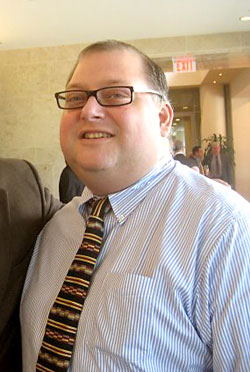
Dixon, an HSU economics major who attended McKinleyville High School, has a track record that demonstrates he is a ‘Humboldt guy’ through and through. He is former chair of the Humboldt County Republican Party and a past executive committee member of the California Republican Party. He was a board member of the Eureka Chamber of Commerce, the Eureka Finance Advisory Board and former Humboldt County Human Rights Commissioner.
Long a community activist and a former private business owner, Dixon decided to resume his education at Humboldt State in 2005 “because I needed something to do while undergoing dialysis.” He is a kidney transplant patient and he is on a waiting list for a new transplant because the first one, performed two years ago, failed in April and denied him graduation last May. It cost him nearly a semester’s worth of academic work, and it wasn’t the first time. He’s been through constant hospitalizations and he’s had to balance his academic load with countless hours of debilitating dialysis (it causes loss of mental focus, among other things) and his time-consuming political responsibilities.
On top of that, he competed for three years and student-assisted for one year on the HSU Debate Team. He also served on an Associated Students fee committee and other student panels.
Dixon knows his way around the CSSA. He was a member of the body’s executive team, serving as External Vice Chair in 2008-09, before assuming the new presidency July 1. He is studying economics at Sacramento State this year as an intersystem visitor, owing to his kidney condition.
Dixon resumed his studies after owning an advertising and public relations firm whose clients ranged from the Humboldt County Fair to Wal Mart and public officials. Despite being on a kidney transplant waiting list and struggling constantly with medical complications, he is indefatigable and looking forward with high expectations to next spring. “Even though I’m at Sac State this year, it’s a matter of pride to me that when I graduate in May, I’ll be a Humboldt grad,” he grins.
The new presidency is geared to making the CSSA a modern political organization and a stronger advocate for student interests, Dixon says. Comprehensive reform was essential, in his view, because the CSSA lacked a single point person to exert leadership. All 23 campuses agreed to the new constitution because the association had become dysfunctional, in his words. “Last year, only 11 schools were members and that had been a trend over the past four or five years. Now we have all 23. We opened up and listened.”
To prevent a conflict of interest, the president is prohibited from serving as an AS officer at his home campus. Accordingly, Dixon focuses on getting CSSA’s message out to as many California legislators as possible. “Individual campuses have little discretion over their budgets. CSSA will spend this year advocating on behalf of CSU in Sacramento and making sure that students understand that our fight is with Sacramento right now, to ensure higher education is considered a priority and not a cost. I call the CSU ‘the great democratizer.’ One economic study after another has shown that women, minority groups and people from lower economic echelons who get a higher education produce returns on investment sometimes double and triple those of individuals educated at private institutions. And that’s exactly who the CSU serves. It educates those who would otherwise not have the opportunity to be educated. Like myself: I’ll be the first member of my family on my dad’s side to earn a college degree. There are a lot of stories like mine, of people who’ve had to overcome adversity, an returning students from the workforce or difficult life circumstances who go back to school to try to better their lives. I hear one story after another like that in the CSU and that’s why I’m happy to be president—I want to serve those students. I don’t need to pad my resume.”
Dixon emphasizes effectiveness above all. “There’s no point standing outside an office door screaming at people and protesting. That’s not enough: you have to go and convince lawmakers that investment in the CSU is worth it. That’s what I intend to do.”